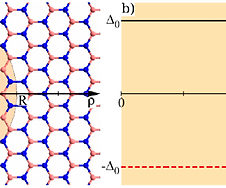Publications

Electronic confinement in graphene quantum rings due to substrate-induced mass radial kink
L. J. P. Xavier, D. R. da Costa, A. Chaves, J. M. Pereira Jr., and G. A. Farias
J. Phys.: Condens. Matter 28, 505501
2016
Abstract
We investigate localized states of a quantum ring confinement in monolayer graphene defined by a circular mass-related potential, which can be induced e.g. by interaction with a substrate that breaks the sublattice symmetry, where a circular line defect provides a change in the sign of the induced mass term along the radial direction. Electronic properties are calculated analytically within the Dirac–Weyl approximation in the presence of an external magnetic field. Analytical results are also compared with those obtained by the tight-binding approach. Regardless of its sign, a mass term $ \Delta $ is expected to open a gap for low-energy electrons in Dirac cones in graphene. Both approaches confirm the existence of confined states with energies inside the gap, even when the width of the kink modelling the mass sign transition is infinitely thin. We observe that such energy levels are inversely proportional to the defect line ring radius and independent on the mass kink height. An external magnetic field is demonstrated to lift the valley degeneracy in this system and easily tune the valley index of the ground state in this system, which can be polarized on either K or ${{K}^{\prime}}$ valleys of the Brillouin zone, depending on the magnetic field intensity. Geometrical changes in the defect line shape are considered by assuming an elliptic line with different eccentricities. Our results suggest that any defect line that is closed in a loop, with any geometry, would produce the same qualitative results as the circular ones, as a manifestation of the topologically protected nature of the ring-like states investigated here.
CONDENSED MATTER THEORY GROUP